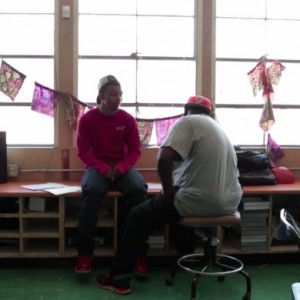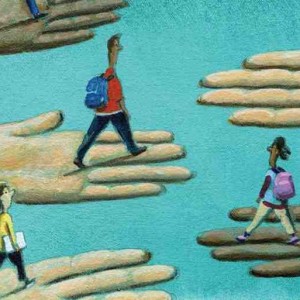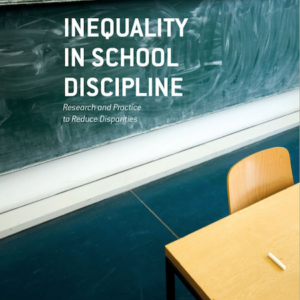Children & Youth School Discipline Reform
Keeping Students in School So They Succeed
United States | 2010 - 2014
Every year, almost 3.5 million school children are suspended from school in the United States, putting many at risk of dropping out and ending up on the pathway to prison. The harshest of disciplinary actions—including arrests and expulsions—most often target students of color. To address the negative impact of these practices, Atlantic invested $47 million to support nationwide reform efforts to keep vulnerable children in school and on track to graduation and college.
As a result of the work Atlantic has supported:
- Awareness that school discipline practices need to change has spread throughout cities, states and the federal government.
- There is greater understanding among the public and educators that suspensions can harm students’ long-term outcomes and the nation’s overall high school graduation rate.
- Increased federal support for school discipline policy reform is helping schools implement alternatives to harsh zero tolerance policies.
- State and local school districts are changing policies to improve school climate and school discipline.
What We Learned From This Work
Connecting key stakeholders and grantees can accelerate movement for the cause, especially when foundations add their voice to the mix to champion new ideas and policy alternatives.
Outside pressure from grassroots advocacy organizations can be most effective when foundations develop strategies to help those on the inside of the system understand the problem and formulate action.
As long as there is agreement on the goal, it's okay for partners to pursue diverse strategies that draw on each organization's strengths. This is an especially successful approach for solving complex problems that no single public- or private-sector player and accomplish on its own.
Zeroing Out the Problem
Here are ways schools and communities worked to rollback unfairly punitive “zero tolerance” policies:
Better Results
Oakland and Baltimore are among the school districts successfully demonstrating how a combination of full-service community schools and school-based health centers can reduce harmful suspensions.
Students Speak Out
Young people have been protesting the destructive impact of zero tolerance policies by taking part in activities organized by groups such as Padres & Jóvenes Unidos in Denver, Youth United for Change in Philadelphia, VOYCE in Chicago and the Urban Youth Collaborative in New York City.
New Approaches Modeled
Some school districts have successfully implemented restorative practices that focus on mediation and agreement rather than punishment. This approach aims to keep students in school and to create a safe environments.
Here’s Who’s Helping Write the Next Chapter in This Continuing Story
Connect With Some of Our Grantee Partners
Advancement Project
Civil Rights Project’s Center for Civil Rights Remedies at UCLA
Communities for Just Schools Fund at The New Venture Fund
Dignity in Schools Campaign
The Discipline Disparities Research-to-Practice Collaborative at Indiana University
Legal Strategies Collaborative of the NAACP Legal Defense Fund
National Clearinghouse on Supportive School Discipline
Oakland Unified School District
Growing Interest in a More Equitable Approach to School Discipline
Summaries of Case Studies, Evaluations & Reports
-
Tracking Suspensions in New York City Public Schools, 2006-2017
Source: Data Collaborative for Justice at John Jay College
In an effort to inform the growing dialogue on school discipline, this report examines trends in suspensions in New York City over an 11-year period (2006-07 to 2016-17) for middle school and high school students. The report reveals that while suspensions on the whole fluctuated,…
Resource type: Research Report
-
Government Partnerships & Engagement
This book offers three case studies on how Atlantic advanced opportunity, dignity and equity for people around the world by engaging and partnering with government.
Resource type: Insight
-
The Atlantic Philanthropies’ School Discipline Reform Portfolio
Source: Philliber Research & Evaluation
Between 2009 and 2016, Atlantic invested $47 million in efforts aimed at ending unfair and excessively punitive discipline policies in U.S. schools that put many students—especially children of color— at risk of ending up on a pathway to prison. Atlantic focused its efforts on raising awareness of the problem of…
Resource type: Evaluation
-
Tilling The Field: Lessons About Philanthropy’s Role in School Discipline Reform
Source: Leila Fiester, Atlas Learning Project
Anyone concerned about how the futures of millions of children are jeopardized because of discipline practices that unfairly exclude students from U.S. public schools will be heartened by this story about how transformative change can happen. It’s a story of how students and parents, civil…
Resource type: Research Report
-
You Can’t Fix What You Don’t Look At: Acknowledging Race in Addressing Racial Discipline Disparities
Source: The Discipline Disparities Collaborative
Recent evidence shows that racial disparities in school discipline are continuing to worsen. According to the latest federal data, black students are suspended and expelled at a rate three and a half times greater than white students. On average, 5 percent of white students are…
Resource type: Research Report
-
A Model Code on Education and Dignity
Source: Dignity in Schools Campaign
Current educational policies and practices are pushing millions of young people out of school. This “pushout” crisis is fueled by many factors, including zero-tolerance and other punitive discipline policies. This report presents a set of recommended policies to schools, districts and legislators to help end school pushout…
Resource type: Research Report
You Might Also Be Interested In
-
Children & Youth
Our investments were driven by the belief that all children have a right to education, health, safety and a comprehensive set of services to help them reach their full potential.
-
Community Schools
Poverty, discrimination and lack of access to high-quality educational opportunities and healthcare hurt young people’s chances of future success. Community schools can help overcome those barriers.
-
Racial Equity
Our final grants to promote racial equity aim to dismantle anti-black racism in the United States and South Africa.
-
Race & Criminal Justice Reform
One in three black men can expect to spend time in prison. We've supported efforts to reduce racial inequality in the criminal justice system.






